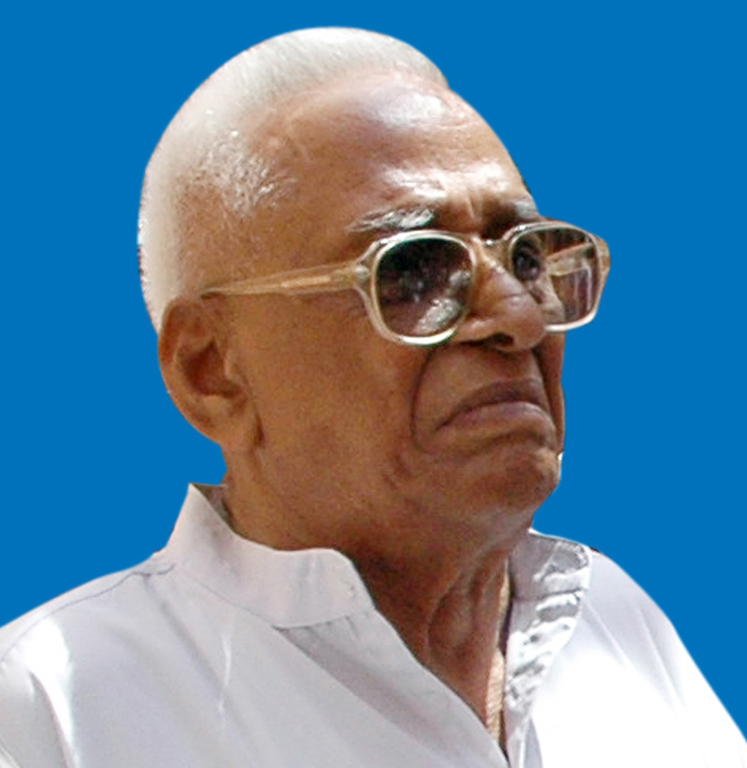
Lal Salam Comrade Parsa
P Satish
Comrade Parsa Satyanarayana, veteran trade union leader and freedom fighter passed away on May 22, 2015 at Eluru in Andhra Pradesh. He was 91 and was not keeping well for some time due to age related complications.
Comrade Parsa, as he was affectionately called, was born into a middle-class family in Kambhampadu village. He was imbibed human values since his childhood by his parents, Venkata Subbamma and Venkamaraju. In his youth, he assisted his uncle, working as an agent for daily newspapers. This acquaintance with newspapers, inculcated reading habit in him and gradually led him to books, which he used to devour in the nearby library. Thus began his transition to progressive politics and ultimately to communism. Upon the advice of Comrade P Sundarayya, he went to Singareni Collieries to build the trade union and communist movement there. He stayed in the house of a local dalit worker and searched for a job, which he ultimately got in the collieries as an oil issuer for the kerosene lamps used by the mine workers. Along with this job, he was entrusted other tasks too, which he performed with sincerity that earned him the affection of all workers.
During the period of Second World War, there used to be a blanket ban on political and trade union activities, especially in collieries and railways. Comarde Parsa became a Party member in 1943, and was thus forced to work underground during this period. Owing to his pioneering work, along with other comrades, Singareni Coal Workers' Union was formed. Seen in the background of the then prevailing circumstances and particularly the Nizam rule, this indeed was a highly risky task. During this time he had developed contacts with many progressive people and was sent as a volunteer to Andhra Mahasabha meeting in Khammam.
The collieries management was alarmed with Comrade Parsa's growing popularity among workers and dismissed him from service alleging that he was undertaking union activities during office hours and performing those tasks in the company site, which are supposed to be done in union office. The spontaneous protests of thousands of workers against this unjust action made the management withdraw its dismissal orders. It was under his guidance that May Day was officially celebrated for the first time by the union in 1946. Comrade Parsa, upon the needs of the Party, subsequently resigned his job and became a whole-time functionary committed to the building of Party in that region.
Comrade Parsa participated in the historic Telangana Armed Struggle as a commander from Palvancha area. He was arrested in 1947, but he escaped from jail in 1949 to join the struggle, but unfortunately was again caught and put behind bars. He was finally released from the jail in 1953. In prison, he was put in solitary confinement and was denied contact even with his family members. Parsa had on him 'shoot-at-sight' orders, issued by the Nizam police who tried to mislead the people declaring that he was dead. In fact, he was let-off without being shot by a police official who was awe-struck by his commitment to the masses.
Parsa was one of the tall leaders of the AITUC and since the formation of CITU, he functioned as the president of its Andhra Pradesh state committee for thirty years, since its foundation.
For many years, Parsa was the editor of Karmikalokam, the monthly organ of CITU, which he nursed as his child and brought it out regularly in a language that made it popular among the workers. He was the national vice president of CITU from 1994-2000.
Parsa was in charge of the coordination committee of working women and always used to encourage women cadres in the trade union movement and insisted on promoting them to leadership positions.
He was elected to the Andhra Pradesh Legislative Assembly from Paloncha constituency in 1962 but later resigned in support of the state wide agitation demanding the Visakha steel plant. He was a member of the state secretariat of the CPI(M) Andhra Pradesh committee. He was imprisoned during China War in 1964. As a tribute to his pioneering contribution in Party building in Kothagudem, the Party had conducted his cremation at Kothagudem.
His life is a saga of struggle and sacrifice. Whatever responsibilities he undertook, he discharged them with distinction. Throughout his life, he fought for the overthrow of capitalist society and the establishment of a society free from exploitation.
In his personal life, Comrade Parsa was simple, unassuming, and extremely amiable. He possessed a wonderful quality to magnetically attract people. He was a good teacher, who taught hundreds of present-day leaders in the Party, about political geography and international developments.
Striving to uphold and live true to the values for which Comrade Parsa fought for all through his life, is the real homage we can pay to the departed comrade.
The secretariat of the Centre of Indian Trade Unions (CITU), in a condolence statement, expressed its profound grief at the passing away of Comrade Parsa Satyanarayana. It offered its heartfelt condolences to Comrade Bharati and bereaved
family members and comrades in the state.
In a condolence message, Sitaram Yechury, general secretary of the Communist Party of India (Marxist) said Comrade Parsa Satyanarayana was a dedicated and steadfast Communist all his life championing the cause of the Indian working class. His life and work will remain a source of inspiration for all those struggling for establishing socialism in India.


